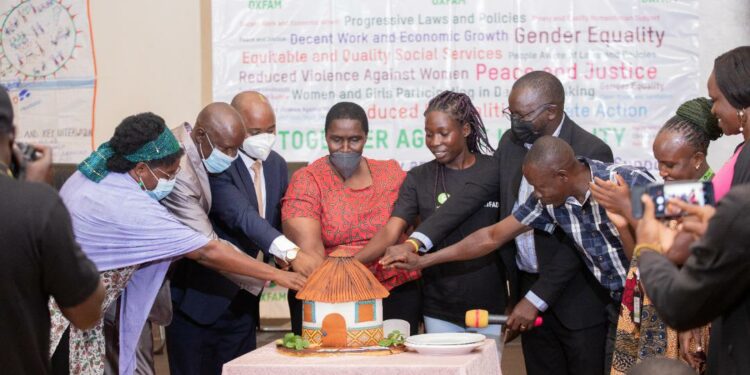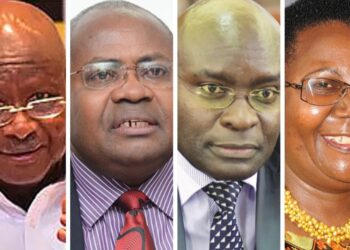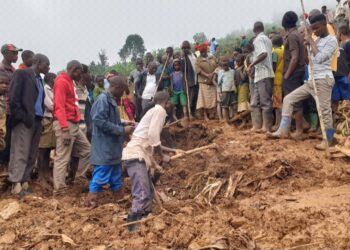After massive successive four years of helping members of rural communities to create their self-led economic, social and political transformation, Oxfam on Tuesday officially ended its Gender Action Learning Systems (GALS) project.
GALS was a structured community-led empowerment methodology that aimed at creating self-led economic, social and political transformation starting at the community level. The methodology worked with women and men to develop their visions for change, appreciate their strengths, and achievements and work collectively to address gender inequalities within the family and community.
Speaking during the closeup event at Royal Suites Hotel in Bugolobi on Tuesday, Francis Shanty Odokorach the Country Director of Oxfam in Uganda said many communities have been improved as a result of GALS.
He added that using the power of symbols and principles of inclusion GALS uses a set of tools, it enabled individuals and households to plan their lives, identify and negotiate their needs and interests for gender-equitable livelihoods, thus enabling them to change the gender and power relations that would otherwise constrain them from achieving their visions.
“As Oxfam, achieving gender justice is at the heart of our work and we define gender justice as the full equality and equity between women and men in all spheres of life, resulting in women jointly and on an equal basis with men, defining and shaping the policies, structures and decisions that affect their lives and society as a whole. Oxfam employs various approaches such as GALS towards addressing gender inequalities,” Mr. Odokorach said.
He noted that although the program ended, it can also be used in different organizations even within the government structures such as Parish Development Model.
“GALS can also be mainstreamed in organizations and with multiple stakeholders to increase the effectiveness of any development process. Within Oxfam and partner Organisations, GALS has been integrated into many projects/interventions, including in Value chains, Humanitarian peacebuilding interventions, Youth, and women economic empowerment.”
According to Odokorach, through GALS, Empowerment Learning Centers (ELCs) for Gender Action Learning System (GALS) to different clients, including Local government, the Private Sector, CSOs, development actors, humanitarian actors, rural households, research/knowledge, and academic institutions have been set and they will still be in operation.
He emphasized that it works with women and men to develop their visions for change, appreciate their strengths and achievements and work collectively to address gender inequalities within the family and community.
“Today, as we come to the end of this project, we have evidence that ELCs provided an opportunity for people to learn about GALS and the different models of how GALS can be integrated into different development projects/programmes. While the project has come to an end, The ELC remain up and running, and clients are assured of quality services. GALS continues to be integrated by the different stakeholders. We had this vision to see GALS embraced by various stakeholders, especially the Government.”
State minister For Gender Labour and Social Development Asamo Grace Hellen appreciated the methodology of GALS because it has helped in dismantling the negative cultural beliefs and reshaped the underlying structural issues that affect women and later enhance women’s economic empowerment. “I particularly appreciate that the methodology is community-led, as this fosters ownership and sustainability.”
“As Government, we made the commitment to embrace this methodology, and I am happy to see that we have made great steps in integrating it into our programmes. As Government, we see potential in using GALS to roll out the Parish model and other development programmes. We will continue exploring this potential. We are also now challenged to revisit policy legislations and have GALS included in the policy as a methodology that will enable men and women to work together and address household gender relations hence improvement in household standards of living,” she said.
She noted that through the GALS project, Oxfam has shown that civil society and Government can work in complementarity towards development. “We know that development is not development if it leaves people, especially women behind. GALS is, therefore, very powerful in improving household gender relations.”
Peace Immaculate Chandini the project coordinator said in the four years the project has greatly improved the livelihood of young people in districts where it had been implemented, especially the youth. “Within this project, we had a component of youth empowerment and we supported about five youth groups across the three districts of Pakwach, Yumbe as well as Arua with a Gender action learning system but also with village saving system. And their saving attitudes have changed in the first cycle alone that ended in May 2021 youth were able to save about Shs11m starting from scratch. In the second cycle ending this month to date, they have saved over Shs36m showing an improvement in saving culture.”
She also added that there is an improvement in household gender relations.
Meanwhile, the project was launched in May 2018 in a phased form, starting with Phase one which run from May 2018 to May 2019, Phase two was from May 2019 to May 2020 focused on exploring a revolving Capacity Development Fund. and Phase three (May 2020 to May 2021) and Phase four (May 2021 to May 2022)
Do you have a story in your community or an opinion to share with us: Email us at editorial@watchdoguganda.com













